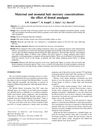 January 2018 in “Springer eBooks”
January 2018 in “Springer eBooks” The document says that early treatment of Acne Vulgaris is important to prevent scarring and that adult onset acne is common in women, often due to hormonal imbalances.
 March 2017 in “Fundamental & Clinical Pharmacology”
March 2017 in “Fundamental & Clinical Pharmacology” The model and estimator can predict drug exposure in kidney transplant patients well.
 March 2017 in “Open access journal of surgery”
March 2017 in “Open access journal of surgery” The document concludes that more standardized research is needed to fully understand and optimize the use of platelet-rich fibrin in regenerative medicine.
 January 2017 in “Springer eBooks”
January 2017 in “Springer eBooks” Eating a balanced diet with specific nutrients can help manage menopause symptoms and prevent related health issues.
 January 2017 in “Elsevier eBooks”
January 2017 in “Elsevier eBooks” Antioxidants may help improve mitochondrial health and could be used to treat diseases related to cell damage.

Benign skin tumors need accurate diagnosis to ensure proper treatment.
 November 2016 in “Zoo biology”
November 2016 in “Zoo biology” Adding more vegetables and fruits improved capybaras' coat quality and health.
 May 2016 in “Cambridge University Press eBooks”
May 2016 in “Cambridge University Press eBooks” Eating disorders are serious, often undiagnosed conditions requiring early treatment, with anorexia being the most deadly and binge-eating the most treatable.
 April 2015 in “Andrology”
April 2015 in “Andrology” HNG may help prevent the negative effects of chemotherapy on sperm production and white blood cell counts.
 January 2015 in “Endocrine updates”
January 2015 in “Endocrine updates” Bariatric surgery patients need careful before and after surgery care for safety and long-term health.
 November 2014 in “John Wiley & Sons, Ltd eBooks”
November 2014 in “John Wiley & Sons, Ltd eBooks” Eating high-glycemic and dairy foods can increase hormones that may cause acne and other health issues.
 September 2014 in “Springer eBooks”
September 2014 in “Springer eBooks” The document concludes that breast pain should be managed with personalized treatment, starting with non-drug methods and progressing to medication if necessary, while considering side effects and patient needs.
 March 2014 in “CRC Press eBooks”
March 2014 in “CRC Press eBooks” Some nutrients and antioxidants may improve skin and hair health, but more research is needed to confirm these benefits.
 January 2012 in “Human health handbooks”
January 2012 in “Human health handbooks” Traditional Indian remedies are used for hair health, but more scientific evidence is needed to prove their safety and effectiveness.
 December 2011 in “The Diabetes Educator”
December 2011 in “The Diabetes Educator” The Blood Glucose Management Service improved patient safety and outcomes in managing blood sugar in hospitalized patients.
 November 2011 in “Advanced Materials Research”
November 2011 in “Advanced Materials Research” Adding 1% hair fibers to brake materials improves friction and wear, making them more effective.
 July 2008 in “Baylor University Medical Center Proceedings”
July 2008 in “Baylor University Medical Center Proceedings” Global oil use will rise, US corn-to-ethanol policy is flawed, and various social and economic issues need attention.
 August 2003 in “International Journal of Cosmetic Surgery and Aesthetic Dermatology”
August 2003 in “International Journal of Cosmetic Surgery and Aesthetic Dermatology” Disposable instruments could be the future of hair restoration surgery to eliminate disease risk, but they require careful preparation and proper training.
 March 2003 in “BJOG: An International Journal of Obstetrics and Gynaecology”
March 2003 in “BJOG: An International Journal of Obstetrics and Gynaecology” Mothers and newborns with dental fillings have higher mercury in their hair, but adding fillings during pregnancy doesn't raise mercury levels further.
 January 1998 in “Journal of Dermatological Treatment”
January 1998 in “Journal of Dermatological Treatment” The document recommends all three dermatology books for a library, noting their detailed content but also suggesting improvements in clarity and consistency.
 October 1997 in “Baylor University Medical Center Proceedings”
October 1997 in “Baylor University Medical Center Proceedings” Obesity in the U.S. is largely influenced by diet and exercise, certain medications can improve heart procedures and hair growth, and major teaching hospitals have better patient outcomes.
 January 1997 in “Elsevier eBooks”
January 1997 in “Elsevier eBooks” Hair and nails are skin parts that develop early and serve protective and functional roles.
 December 1984 in “British journal of addiction”
December 1984 in “British journal of addiction” Doctors linked maternal drinking to infant mortality and national decline, leading to public awareness and changes in law.

Caffeine can potentially treat common hair loss by counteracting hair follicle shrinkage caused by hormones.
 January 2017 in “Cogent Medicine”
January 2017 in “Cogent Medicine” Extracts improve hair growth in alopecia.
 January 2012 in “Vitamins & trace elements”
January 2012 in “Vitamins & trace elements” Smoking and drinking can lower vitamin levels and potentially trigger early hair loss, but overall vitamin levels don't seem to affect hair loss duration.
 November 2003 in “Journal of Dermatology”
November 2003 in “Journal of Dermatology” Authors defend finasteride-depression link, suggest detailed medical history, and call for more investigation.
 September 2002 in “Dermatologic Surgery”
September 2002 in “Dermatologic Surgery” Male pattern baldness affects 38.52% of Asian men in Bangkok, increasing with age and possibly linked to environment and diet.
 4 citations,
February 2022 in “Journal of Pharmaceutical and Biomedical Analysis”
4 citations,
February 2022 in “Journal of Pharmaceutical and Biomedical Analysis” The conclusion is that a new method can measure caffeine and drugs in hair, finding caffeine abusers have 70 times more caffeine than normal, with a proposed cut-off value for abuse.
2 citations,
August 2021 in “Journal of Natural Fibers”





























